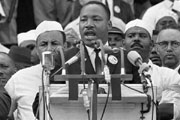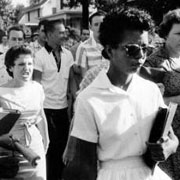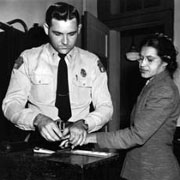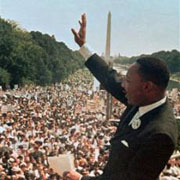VOA慢速英语2011--American History: The Civil Rights Movement
时间:2019-01-12 作者:英语课 分类:2011年VOA慢速英语(十一)月
THE MAKING OF A NATION - American History: The Civil Rights Movement
STEVE EMBER: Welcome to THE MAKING OF A NATION – American history in VOA Special English. I’m Steve Ember.
Today, we tell about the movement for civil rights for black Americans.
(SOUND)
The day is August twenty-eighth, nineteen sixty-three. More than two hundred fifty thousand people are gathered in Washington. Black and white, young and old, they demand equal treatment for black Americans. The nation's most famous civil rights leader, the Reverend Martin Luther King Junior, is speaking.
MARTIN LUTHER KING: "I am happy to join with you today in what will go down in history as the greatest demonstration 1 of freedom in the history of our nation."
(MUSIC)
Early in its history, black Africans were brought to America as slaves. They were bought and sold, like animals. By the time of America's Civil War in the eighteen sixties, many had been freed by their owners. Many, however, still worked as slaves on the plantations 2, or large farms, of the South. By the end of the war, slavery had been declared unconstitutional. But that was only the first step in the struggle for equality.

Dr. Martin Luther King Jr. addresses marchers during his "I Have a Dream" speech at the Lincoln Memorial in Washington
Most people of color could not get good jobs. They could not get good housing. They had far less chance of a good education than white Americans. For about one hundred years, blacks made slow gains. Widespread activism for civil rights did not really begin until after World War Two. During the war, black Americans earned respect as members of the armed forces. When they came home, many demanded that their civil rights be respected, too. An organization, the National Association for the Advancement 3 of Colored People, led the way.
In nineteen fifty-one, the organization sent its lawyers to help a man in the city of Topeka, Kansas. The man, Oliver Brown, and twelve others had brought legal action against the city. They wanted to end racial separation in their children's schools. That policy was known as segregation 4.
At that time, two of every five public schools in America had all white students or all black students. The law said all public schools must be equal, but they were not. Schools for white children were almost always better than schools for black children. The situation was worst in Southern states.
The case against the city of Topeka -- Brown versus 5 the Board of Education -- was finally settled by the nation's highest court. In nineteen fifty-four, the Supreme 6 Court ruled that separate schools for black children were not equal to schools for white children. The next year, it said public schools must accept children of all races as quickly as possible.
(MUSIC)

Student Elizabeth Eckford and the angry crowd that followed her on September fourth, 1957
In September nineteen fifty-seven, a black girl attempted to enter an all-white school in the city of Little Rock, Arkansas.
(SOUND)
An angry crowd shouted at her. State guards blocked her way. The guards had been sent by the state governor, Orville Faubus. After three weeks, a federal court ordered Governor Faubus to remove the guards. The girl, Elizabeth Eckford, and other black students were able to enter the school. After one day, however, riots forced the black students to leave.
President Dwight Eisenhower ordered federal troops to Little Rock. They helped black students get into the white school safely. However, angry white citizens closed all the city's public schools. The schools stayed closed for two years.
(MUSIC)
In nineteen sixty-two, a black student named James Meredith sought to attend the University of Mississippi. School officials refused. John Kennedy, the president at that time, sent federal law officers to help him.
James Meredith became the first black person to graduate from the University of Mississippi.
In addition to fighting for equal treatment in education, black Americans fought for equal treatment in housing and transportation.
(SOUND)
In many cities of the South, blacks were forced to sit in the back of buses. In nineteen fifty-five, a black woman named Rosa Parks got on a bus in the city of Montgomery, Alabama. She sat in the back. The bus became crowded. There were no more seats for white people. So, the bus driver ordered Missus Parks to stand and give her seat to a white person.

Rosa Parks is fingerprinted 7 at a police station in Montgomery, Alabama, in nineteen fifty-five, after her arrest for refusing to give her bus seat to a white person
She refused. Her feet were tired after a long day at work. Rosa Parks was arrested.
MARTIN LUTHER KING: “For a number of years, Negro passengers on the city bus lines of Montgomery have been humiliated 8, intimidated 9, and faced threats on this bus line.”
The Reverend Martin Luther King organized the black citizens of Montgomery. They were the major users of the bus system. They decided 10 to stop using the buses.
MARTIN LUTHER KING: “At present, we are in the midst of a protest, the black citizens of Montgomery, representing some 44 percent of the population. Ninety percent, at least, of the regular Negro bus passengers are staying off the buses, and we plan to continue until something is done.”
(MUSIC)
The boycott 11 lasted a little more than a year. It seriously affected 12 the earnings 13 of the bus company. In the end, racial separation on the buses in Montgomery was declared illegal. Rosa Parks' tired feet had helped win black Americans another victory in their struggle for equal rights. And, the victory had been won without violence.
The Reverend King was following the teachings of former Indian leader Mohandas Gandhi. Gandhi urged his followers 14 to reach their political goals without violence. One of the major tools of non-violence in the civil rights struggle in America was the "sit-in". In a sit-in, protesters entered a store or public eating place. They quietly asked to be served. Sometimes, they were arrested. Sometimes, they remained until the business closed. But they were not served. Some went hours without food or water.
(MUSIC: “Buses Are A-Coming”)
Another kind of protest was the "freedom ride." This involved buses that traveled through states from the North to the South. On freedom rides, blacks and whites sat together to make it difficult for officials to enforce racial separation laws on the buses.

This Freedom Riders bus went up in flames when a fire bomb was tossed through a window near Anniston, Alabama in 1961
Many freedom rides -- and much violence -- took place in the summer of nineteen sixty-four. Sometimes, the freedom riders were arrested. Sometimes, angry crowds of whites beat the freedom riders.
(MUSIC)
Perhaps the most dangerous part of the civil rights movement was the campaign to win voting rights for black Americans. The Fifteenth Amendment 15 to the Constitution said a citizen could not be denied the right to vote because of race or color. Several Southern states, however, passed laws to try to deny voting rights to blacks for other reasons.
Martin Luther King and his supporters demanded new legislation to guarantee the right to vote. They held protests in the state of Alabama. In the city of Birmingham, the chief law officer ordered his men to fight the protesters with high-pressure water hoses and fierce dogs.
People throughout the country watched the demonstration on television. The sight of children being beaten by policemen and bitten by dogs awakened 16 many citizens to the civil rights struggle. Federal negotiators reached a compromise. The compromise was, in fact, a victory for the protesters. They promised to stop their demonstrations 17. In exchange, they would be permitted to vote.
(MUSIC: “The Freedom Train Is Coming”)
President Lyndon Johnson signed a major civil rights bill in nineteen sixty-four. Yet violence continued in some places. Three civil rights workers were murdered in Mississippi. One was murdered in Alabama.
Martin Luther King kept working toward the goal of equal rights. On April fourth nineteen sixty-eight, he died working toward that goal.
King was shot to death in Memphis, Tennessee. He had gone there to support a strike by waste collection workers.
WALTER CRONKITE: “Doctor King was standing 18 on the balcony of his second floor hotel room tonight when, according to a companion, a shot was fired from across the street. In the friend’s words, the bullet exploded in his face.”
CBS newsman Walter Cronkite.
WALTER CRONKITE: “The police, who have been keeping a close watch over the Nobel Peace Prize winner because of Memphis’ turbulent racial situation, were on the scene almost immediately. They rushed the thirty-nine year old Negro leader to a hospital, where he died of a bullet wound in the neck.”
A white man, James Earl Ray, was tried and found guilty of the crime.
(MUSIC)
A wave of unrest followed the murder of Martin Luther King. Blacks in more than one hundred cities in America rioted. In some cities, areas affected by the riots were not rebuilt for many years. The movement for civil rights for black Americans continued. But it became increasingly violent. The struggle produced angry, bitter memories. Yet it also produced some of the greatest words spoken in American history.

This August 28, 1963, file photo shows Dr. Martin Luther King Jr. waving to the crowd at the Lincoln Memorial for his "I Have a Dream" speech during the March on Washington
MARTIN LUTHER KING: "When we allow freedom to ring, when we let it ring from every village and every hamlet, from every state and every city, we will be able to speed up that day when all of God's children -- black men and white men, Jews and Gentiles, Protestants and Catholics -- will be able to join hands and sing in the words of the old Negro spiritual: 'Free at last! Free at last! Thank God almighty 19, we are free at last!'"
(MUSIC)
Nest week, we continue the story of the United States in the nineteen sixties.
You can find our series online with transcripts 20, MP3s, podcasts and pictures at voanews.cn. You can also follow us on Facebook and Twitter at VOA Learning English. I’m Steve Ember, inviting 21 you to join us again next week for THE MAKING OF A NATION -- American history in VOA Special English.
___
Contributing: Jerilyn Watson
- His new book is a demonstration of his patriotism.他写的新书是他的爱国精神的证明。
- He gave a demonstration of the new technique then and there.他当场表演了这种新的操作方法。
- Soon great plantations, supported by slave labor, made some families very wealthy. 不久之后出现了依靠奴隶劳动的大庄园,使一些家庭成了富豪。 来自英汉非文学 - 政府文件
- Winterborne's contract was completed, and the plantations were deserted. 维恩特波恩的合同完成后,那片林地变得荒废了。 来自辞典例句
- His new contribution to the advancement of physiology was well appreciated.他对生理学发展的新贡献获得高度赞赏。
- The aim of a university should be the advancement of learning.大学的目标应是促进学术。
- Many school boards found segregation a hot potato in the early 1960s.在60年代初,许多学校部门都觉得按水平分班是一个棘手的问题。
- They were tired to death of segregation and of being kicked around.他们十分厌恶种族隔离和总是被人踢来踢去。
- The big match tonight is England versus Spain.今晚的大赛是英格兰对西班牙。
- The most exciting game was Harvard versus Yale.最富紧张刺激的球赛是哈佛队对耶鲁队。
- It was the supreme moment in his life.那是他一生中最重要的时刻。
- He handed up the indictment to the supreme court.他把起诉书送交最高法院。
- The criminal was fingerprinted in the sheriff's office. 罪犯在警长办公室里被取下指纹。 来自辞典例句
- They were then taken to be photographed and fingerprinted. 然后,他们被带去照相、留指纹。 来自互联网
- Parents are humiliated if their children behave badly when guests are present. 子女在客人面前举止失当,父母也失体面。
- He was ashamed and bitterly humiliated. 他感到羞耻,丢尽了面子。
- We try to make sure children don't feel intimidated on their first day at school. 我们努力确保孩子们在上学的第一天不胆怯。
- The thief intimidated the boy into not telling the police. 这个贼恫吓那男孩使他不敢向警察报告。 来自《简明英汉词典》
- This gave them a decided advantage over their opponents.这使他们比对手具有明显的优势。
- There is a decided difference between British and Chinese way of greeting.英国人和中国人打招呼的方式有很明显的区别。
- We put the production under a boycott.我们联合抵制该商品。
- The boycott lasts a year until the Victoria board permitsreturn.这个抗争持续了一年直到维多利亚教育局妥协为止。
- She showed an affected interest in our subject.她假装对我们的课题感到兴趣。
- His manners are affected.他的态度不自然。
- That old man lives on the earnings of his daughter.那个老人靠他女儿的收入维持生活。
- Last year there was a 20% decrease in his earnings.去年他的收入减少了20%。
- the followers of Mahatma Gandhi 圣雄甘地的拥护者
- The reformer soon gathered a band of followers round him. 改革者很快就获得一群追随者支持他。
- The amendment was rejected by 207 voters to 143.这项修正案以207票对143票被否决。
- The Opposition has tabled an amendment to the bill.反对党已经就该议案提交了一项修正条款。
- She awakened to the sound of birds singing. 她醒来听到鸟的叫声。
- The public has been awakened to the full horror of the situation. 公众完全意识到了这一状况的可怕程度。 来自《简明英汉词典》
- Lectures will be interspersed with practical demonstrations. 讲课中将不时插入实际示范。
- The new military government has banned strikes and demonstrations. 新的军人政府禁止罢工和示威活动。
- After the earthquake only a few houses were left standing.地震过后只有几幢房屋还立着。
- They're standing out against any change in the law.他们坚决反对对法律做任何修改。
- Those rebels did not really challenge Gods almighty power.这些叛徒没有对上帝的全能力量表示怀疑。
- It's almighty cold outside.外面冷得要命。
- Like mRNA, both tRNA and rRNA are transcripts of chromosomal DNA. tRNA及rRNA同mRNA一样,都是染色体DNA的转录产物。 来自辞典例句
- You can't take the transfer students'exam without your transcripts. 没有成绩证明书,你就不能参加转学考试。 来自辞典例句